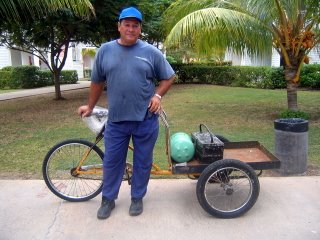Saturday, November 25, 2006
Cuban practicality
My wife was in Cuba recently. She met a friendly man who worked at their hotel. Any story that starts off like this sounds like bad news for me, but it turns out that as well as being an amicable guy, he had an interesting bicycle. My wife took a photo for me.

It's a single speed, probably with coaster brakes, but I can't see the actual brake. Could it be a fixed gear? Possibly, but I doubt it, since this is a popular model there. The land is generally flat in this part of Cuba, so the one gear gets the job done.
The steering is unusual on this machine. It looks like the carrying platform rotates with the front axle, which means that to turn right, the handlebars would need to be pushed to the left.
Apparently this is the standard workhorse of a tricycle in the hotel area. Strangely, my wife said outside the hotels, she didn't see a lot of bicycles. Gasoline is expensive and the most popular solution seems to be to walk or hitchhike.

It's a single speed, probably with coaster brakes, but I can't see the actual brake. Could it be a fixed gear? Possibly, but I doubt it, since this is a popular model there. The land is generally flat in this part of Cuba, so the one gear gets the job done.
The steering is unusual on this machine. It looks like the carrying platform rotates with the front axle, which means that to turn right, the handlebars would need to be pushed to the left.
Apparently this is the standard workhorse of a tricycle in the hotel area. Strangely, my wife said outside the hotels, she didn't see a lot of bicycles. Gasoline is expensive and the most popular solution seems to be to walk or hitchhike.
Labels: foreign affairs, hpv, utility cycling
Darren J 11/25/2006 11:48:00 a.m.
2 Comments:
For a moment there, I thought the thing was front wheel drive...
I spent May in Havana, and can say that bikes are quite popular in the city. Apparently a million bicycles were imported from China by the government during the Special Period (the economic crisis of the early '90s). Oddly bike are almost never left locked and unattended on the street. You generally pay attendents to watch bikes and motorbikes (costs a peso and they give you a little metal tag)...



